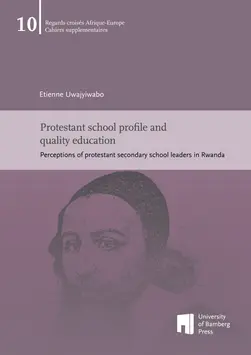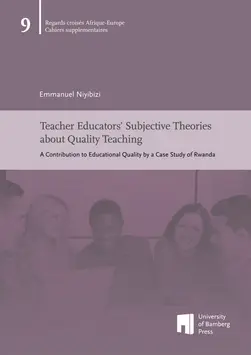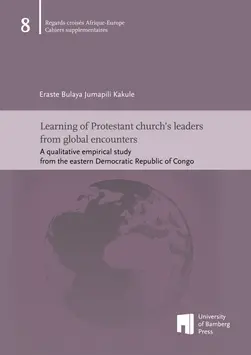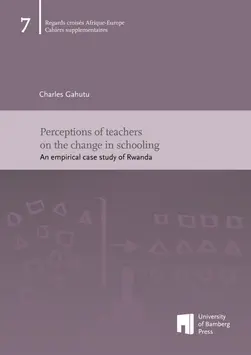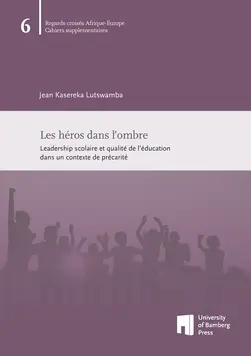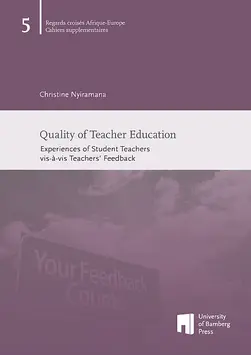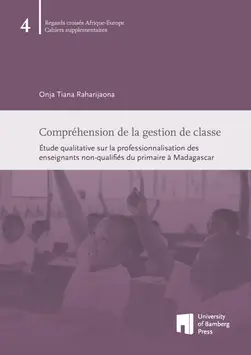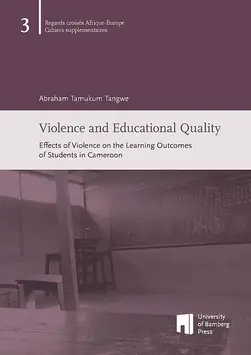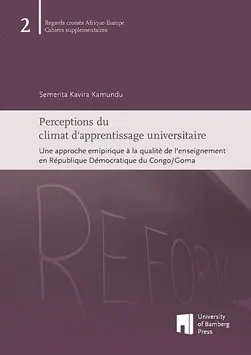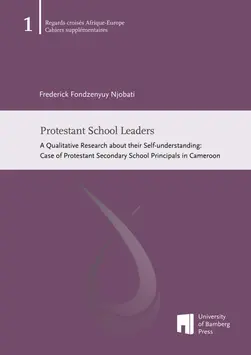Regards croisés Afrique-Europe. Cahiers supplémentaires
Regards croisés Afrika-Europa. Beihefte
Regards croisés Africa-Europe. Supplements
(RcAE.Cs)
In der Reihe RcAE.Cs werden Dissertationen, Abschlussarbeiten, Sammelbände und andere Publikationen veröffentlicht, die aus der Afrikakooperation der Universität Bamberg hervorgegangen sind oder in unmittelbarer Beziehung zu ihr stehen. Die Reihe ist interdisziplinär angelegt; Schwerpunkte sind die Bereiche Geschichte, Sprach- und Literaturwissenschaften, Pädagogik und Theologie.
La série RcAE.Cs publie des thèses, des mémoires, des ouvrages collectifs et d'autres publications qui sont issus de la coopération africaine de l'Université de Bamberg ou qui y sont directement liés. La série est concue comme interdisciplinaire ; l'accent est mis sur l'histoire, la linguistique et les études littéraires, l'éducation et la théologie.
The RcAE.Cs series publishes dissertations, theses, anthologies and other publications that have emerged from or are directly related to the University of Bamberg's cooperation with Africa. The series is designed to be interdisciplinary focussing particularly on the fields of history, linguistics and literary studies, pedagogy and theology.
Herausgegeben von Klaus van Eickels, Annette Scheunpflug
ISSN: 2749-8743, eISSN: 2749-8751
Schriftenreihe im Forschungsinformationssystem (FIS) der Universität
Bisher erschienene Bände
Protestant school profile and quality education : Perceptions of protestant secondary school leaders in Rwanda / Etienne Uwajyiwabo
Bamberg: Univ. of Bamberg Press, 2024
(Regards croisés Afrique-Europe. Cahiers supplémentaires ; 10)
978-3-98989-032-9
Preis: 20,00 €
The present study was conducted to investigate the perceptions of protestant school leaders on the relationship between the protestant school profile and quality education in Rwanda. The choice of the topic was based on the recognized contribution of the protestant school profile to quality education improvement and on the research gap on this relationship in Rwanda. The research process was guided by the following main research question: What are the perceptions of protestant school leaders on the protestant school profile and its relation with quality education? To achieve the study objective, a qualitative research approach was adopted using a semi-structured interview to collect data by use of theoretical sampling. For data analysis, qualitative content analysis was used. Through the abduction process, three types of profiles were generated, including vocation-based, Institution-based, and socio-spiritual profiles. The discussion of the results in light of the existing literature highlights a positive contribution of the protestant school profile to quality education, limited to quality output. Additionally, the discussion demonstrates a positive contribution of the protestant school profile to the promotion of unity and reconciliation in Rwanda, to the economic development of Rwanda, as well as to the promotion of religious plurality. Finally, recommendations are addressed to different stakeholders in protestant education in Rwanda including school leaders, school owners, the protestant council of Rwanda, and the Ministry of education.
Zugriff auf den Volltext:
https://doi.org/10.20378/irb-97883
Teacher Educators’ Subjective Theories about Quality Teaching : A Contribution to Educational Quality by a Case Study of Rwanda / Emmanuel Niyibizi
Bamberg: Univ. of Bamberg Press, 2024
(Regards croisés Afrique-Europe. Cahiers supplémentaires ; 9)
978-3-98989-024-4
Preis: 23,00 €
This study focuses on exploring subjective theories of teacher educators about quality teaching in the context of their profession in Rwanda. It is based on determinant role of subjective theories in educational quality improvement. Additionally, teacher educators are the driving forces due to their role in the initial and continuous teacher education. However, empirical research on teacher educators’ subjective theories is very limited in the Global South including Rwanda. Due to the exploratory nature this study, a qualitative approach using semi-structured interviews was used to collect data from 32 teacher educators theoretically sampled. Using content analysis, iterative deductive-inductive process as well as the generalisation of results through abduction, the results show that interviewed teacher educators have four ideal types of subjective theories. They include subjective theories focusing on: formalities by compliance (following pedagogical and administrative formalities); knowledge by transmission (transmission of immutably prescribed knowledge); behaviour by imitation (learning by imitation) and competences by co-construction (development of competences through active, interactive and reflective approaches). The generated typology enlightens research, policy and practice regarding quality teaching and teacher education in Rwanda and possibly similar contexts.
Zugriff auf den Volltext:
https://doi.org/10.20378/irb-97964
Learning of Protestant church’s leaders from global encounters : a qualitative empirical study from the eastern Democratic Republic of Congo / Eraste Bulaya Jumapili Kakule
Bamberg: Univ. of Bamberg Press, 2024
(Regards croisés Afrique-Europe. Cahiers supplémentaires ; 8)
978-3-98989-008-4
Preis: 22,00 €
This study explores the learning acquired by the Protestant church’s leaders with regard to partaking in global encounters. It was conducted in the eastern part of the Democratic Republic of Congo, a Sub-Saharan country that has been facing heavy crises due to armed conflicts and unstable political institutions for decades. The study focuses on the church leader’s learning outside academy, as they get in touch with other people and places globally. The research discourse sums up what education or learning would be as ‘lifelong learning’. For church leaders from the Democratic Republic of Congo, so far, no research has been conducted about their global and informal learning, their global encounter-related experiences and the implemented improvement ideas brought from abroad. Being conceptualized as a qualitative empirical research, the relating data were collected using individual semi-structured interviews with 28 Protestant church leaders from three major Protestant church denominations in the area of study. From the content analysis applied to them, five ideal types of learning from global encounters emerged, namely the personal well-being-oriented learning, the own ministry-oriented learning, the local society-oriented learning, the organisational change-oriented learning, and the world society-oriented learning. These types were discussed in light of quality global/informal learning and its importance in shaping both local and global societies. Recommendations for practice and further research close the study.
Zugriff auf den Volltext:
https://doi.org/10.20378/irb-95354
Perceptions of teachers on the change in schooling : an empirical case study of Rwanda / Charles Gahutu
Bamberg: Univ. of Bamberg Press, 2024
(Regards croisés Afrique-Europe. Cahiers supplémentaires ; 7)
978-3-98989-004-6
Preis: 21,00 €
This study investigates the perceptions of teachers of change in schooling. It is contextualized in the After-Genocide Rwanda; a period marked by a plethora of social and economic transformations as well as sporadic educational changes. Similarly, the world is experiencing manifold changes which reshape social relations, individual and societal needs, the structure of the labour market and the understanding of life. The school system has been overhauled in its dimensions; however, this dynamicity did not get a similar echo from the scientific community. The study at hand stands out by its intention to give voice to teachers and bring to the fore their digestion of both changes in schooling and the current changing environment. A sample of 30 teachers was given room to share their perceptions of change through semi-structured interviews.
The main finding of this research is the differentiated perception of the change by the teachers in three ideal types with associated different potentials to promote change: the instrumental understanding of the change as policy-oriented for a stable society, the vacillating understanding of the change as context adaptation-oriented for integration into the global world and the functional understanding of the change as human capital investment-oriented for a knowledge society. Again, this study reveals a differing perception of the changing world between optimism and pessimism. These findings have been discussed in line with theories of teachers’ agency in change, school improvement, and globalization.
Zugriff auf den Volltext:
https://doi.org/10.20378/irb-95351
Les héros dans l’ombre : Leadership scolaire et qualité de l’éducation dans un contexte de précarité / Jean Kasereka Lutswamba
Bamberg: Univ. of Bamberg Press, 2023
(Regards croisés Afrique-Europe. Cahiers supplémentaires ; 6)
978-3-86309-914-5
Preis: 21,00 €
L’étude porte sur le leadership scolaire dans les écoles maternelles, primaires et secondaires de la RDC. En RDC et dans d’autres pays de l’Afrique sub-saharienne, bien d’écoles fonctionnent dans des conditions très précaires. Pourtant les objectifs du Développement durable (ODD) présentent l’éducation de qualité comme exigence et droit de tout enfant. La précarité ne devrait donc pas constituer en aucun cas, une excuse pour cette éducation de qualité. Considérant l’importance du leadership scolaire dans l’effectivité des apprentissages, l’étude propose une analyse sur les types du leadership scolaire à appliquer pour développer la qualité de l’éducation même en situation de précarité. Grâce à une approche qualitative, aux interviews semi-structurées, à la théorie ancrée et à l’abduction, l’étude a dégagé cinq types principaux et idéaux du leadership scolaire : le leadership instructionnel (accent sur le processus enseignement-apprentissage), le leadership partagé (accent sur l’implication de tous), le leadership entrepreneurial (accent sur l’entrepreneuriat), le leadership situationnel (accent sur le style de leadership à appliquer suivant le contexte) et le leadership d’inertie (accent sur les procédures et l’autorité). Ces types ont été discutés suivant leurs impacts respectifs sur l’éducation de qualité. Quelques suggestions sur l’amélioration du système éducatif de la RDC concluent cette étude.
Zugriff auf den Volltext:
https://doi.org/10.20378/irb-58608
Quality of Teacher Education : Experiences of Student Teachers vis-à-vis Teachers’ Feedback / Christine Nyiramana
Bamberg: Univ. of Bamberg Press, 2023
(Regards croisés Afrique-Europe. Cahiers supplémentaires ; 5)
978-3-86309-912-1
Preis: 22,00 €
This study focused on investigating the learning situation of student teachers especially their experiences on feedback they receive during their study time including teaching practice. It was conducted in Rwanda. The study was guided by the theories on educational quality which, on one side, places teacher education at the central position of ensuring effective teaching and learning process. In this line, effective training to make sure that teachers are taught in the same way they are expected to teach is essential. On the other side, feedback, which is an important element of the learning engine, is indicated necessary for ensuring that student teachers learn from a conducive environment. This study intended to answer the research question “How does teacher education look like regarding feedback in the Rwandan context?”. To answer this research question, the study was conceptualized as a qualitative research where semi-structured interviews were conducted with 32 student teachers who have been selected using a theoretical sampling strategy from 13 Rwandan Higher Learning Institutions. Data collection was done in combination with data analysis to maximize all the qualities in the field. Qualitative content analysis using intertwined deductive-inductive approach has been used for data analysis. With abduction process, a deep analysis of the empirical data led to the definition of criteria and then ideal types of feedback experienced by student teachers in Rwanda. With this analysis, three types of feedback namely administrative feedback, correctional feedback, and instructional feedback emerged. Further analysis showed that student teachers in Rwanda experience different forms of feedback. They have divergent understandings of feedback. Delayed feedback leads to increased uncertainty among students, communication of feedback creates different forms of relationships between student teachers and teacher educators. In addition, student teachers learn implicitly from teacher educators how to provide feedback, and there are no common standards regarding internships. The analysis of the results of this study with regard to the discourse on teacher education, feedback, and educational quality indicates that feedback in teacher education has a multidimensional effect.
Zugriff auf den Volltext:
https://doi.org/10.20378/irb-58417
Compréhension de la gestion de classe : Étude qualitative sur la professionnalisation des enseignants non-qualifiés du primaire à Madagascar / Onja Tiana Raharijaona
Bamberg: Univ. of Bamberg Press, 2023
(Regards croisés Afrique-Europe. Cahiers supplémentaires ; 4)
978-3-86309-909-1
Preis: 21,00 €
Cette étude porte sur la compréhension de la gestion de classe par les enseignants non-qualifiés, et ce, à l’égard de leur professionnalisation. Son contexte se situe au niveau de l’enseignement primaire à Madagascar. 16,9% des enseignants du primaire ont une qualification professionnelle initiale. D’après le discours scientifique, la gestion de classe constitue un aspect non compensable de la qualité de l’enseignement à côté de la connaissance de la matière. La majorité des recherches empiriques sur cette thématique sont issues des données provenant de pays développés et se concentrent sur les enseignants ayant une formation théorique avant d’entrer dans la pratique. De ce fait, cette étude qualitative se focalise sur les perceptions de la gestion de classe par les enseignants non-qualifiés, en rapport avec leur professionnalisation. Les données ont été collectées auprès d’un échantillon de 30 enseignants non-qualifiés du primaire en utilisant la méthode d’interview semi-structurée via une méthodologie qualitative. Suite à une analyse de contenus, trois types idéaux émergent de l’exploration du matériau de recherche à savoir la gestion de classe basée sur une autorité hiérarchique en vue d’une organisation stricte ; la gestion de classe basée sur les expériences de l’enseignant en vue d’une vie tranquille et la gestion de classe basée sur l’implication des élèves en vue d’un apprentissage. Ces résultats sont discutés à la lumière des théories de la qualité de l’éducation, du développement de la société et de la théologie protestante. Enfin, les réflexions sur les résultats empiriques obtenus engendrent une série de recommandations vis-à-vis de la recherche et de la pratique éducative.
Zugriff auf den Volltext:
https://doi.org/10.20378/irb-58418
Violence and educational quality : effects of violence on the learning outcomes of students in Cameroon / Abraham Tamukum Tangwe
Bamberg: Univ. of Bamberg Press, 2021
(Regards croisés Afrique-Europe. Cahiers supplementaires ; 3)
978-3-86309-823-0
Preis: 19,00 €
This study was initiated to examine violence and its relation to learning outcomes of secondary school students in Cameroon. The study interconnected with educational quality values, and responsible behavior. Violence at school is still observable on a daily basis, not respecting the human rights of children and young learners and hindering them from learning despite the attempts of the government in Cameroon to institute quality service delivery policies, more equitable distribution of learning opportunities, and a strong incentive for greater efficiency in school through legislations. The study was guided by the social interaction theory and the research question focused on the extent of violence in education. The specific objective of this study was to understand the effects of violence on motivation and self-esteem, and its influence on learning outcomes. A model was operationalized measuring the different forms of violence, mediated by self-esteem, motivation and health to the learning outcome, quantified by class repetition, grades and reading enjoyment. The socio-economic context was statistically controlled. The study was designed using a quantitative approach with cross-sectional survey for students. Data had been collected from a sample population of 924 students in grades four to seven in Cameroon. The collected information was analyzed using descriptive statistics, and inferential statistics. The results indicate an acute prevalence of school the various forms violence, and the huge ratio of violence in the life of students in Cameroon becomes visible. The study shows that these experiences of violence affect the self-esteem and the motivation to learn. In addition, the poor school quality and a very discouraging socioeconomic background of students can be shown. Schools are neither an environment of the protection of students nor open spaces for real-world transmission of values. Violence remains a challenge.
Zugriff auf den Volltext:
https://doi.org/10.20378/irb-51605
Perceptions du climat d'apprentissage universitaire : une approche emipirique à la qualitè de l'enseignement en République Démocratique du Congo/Goma / Semerita Kavira Kamundu
Bamberg: Univ. of Bamberg Press, 2021
(Regards croisés Afrique-Europe. Cahiers supplementaires ; 2)
978-3-86309-821-6
Preis: 18,00 €
This study focuses on learning climate in universities in the Democratic Republic of Congo. Learning climate constitutes one of the most important criteria for educational quality as it influences the learning outcome. The study is conducted in the DRC, one of the developing countries of Sub-Saharan Africa, where the quality of education is very important to remedy the traditional educational system applied in several schools and universities. Using a qualitative approach with semi-structured interviews (n = 32) based on a theoretical sampling, following grounded theory, four types of climate were revealed in the data analysis: The climate based on learning where the learner feels better considered, the climate based on social relations where the interactions between the teacher and the learner are positive, the climate based on the teacher where the learner is passive, and the climate based on the use of authority where the learner only submits to the decisions of the authority. These four types are discussed in relation to their functionality to learning and recommendations for the further development of universities are given.
Zugriff auf den Volltext:
https://doi.org/10.20378/irb-51583
Protestant School Leaders : A Qualitative Research about their Self-understanding: Case of Protestant Secondary School Principals in Cameroon / Frederick Fondzenyuy Njobati
Bamberg: Univ. of Bamberg Press, 2025
(Regards croisés Afrique-Europe. Cahiers supplémentaires ; 1)
978-3-98989-058-9
Preis: 24,00 €
The study is concerned with the self-understanding of Protestant secondary school principals about their school leadership in the context of Cameroon where education is rooted in missionary and colonial times. The debate at international level on whether or not none-state schools are widening inequality gaps and whether school leadership is contributing to enlightenment or to fundamentalism matter in researching about the Protestant school profile and leadership. The study therefore seeks to answer the research question, “What are the perceptions of secondary school principals of Protestant schools about their school leadership?”
The research was conceptualized as exploratory and hypothesis-generating within the qualitative approach. It used semi-structured interviews to collect data from 26 theoretically sampled secondary school principals. The data was analyzed by qualitative content analysis using the grounded theory in an iterative deductive-inductive way. Through the generalization process of abduction and by a deep analysis of the empirical data, the criteria which constitute the categories of quality first emerged. Thereafter, six ideal types of leading understanding were generated and consists of (1) call for superiority leadership, (2) state-conformational leadership, (3) ecclesiastical leadership, (4) community-participatory leadership, (5) vocation to serve leadership and (6) diaconal leadership. Further analysis revealed a multi-dimensional self-understanding by principals on the Protestant ethos of schools and their leadership function. Thus, not all the six ideal leadership types are contributing to quality education. On the one hand, there are fundamentalist leaders focusing on normative aspects of discipline while on the other hand, there are leaders promoting democratic values or working in a diaconal way, promoting social justice. Furthermore, principals show little awareness of belonging to the church as a global institution.
Zugriff auf den Volltext:
https://doi.org/10.20378/irb-107317

